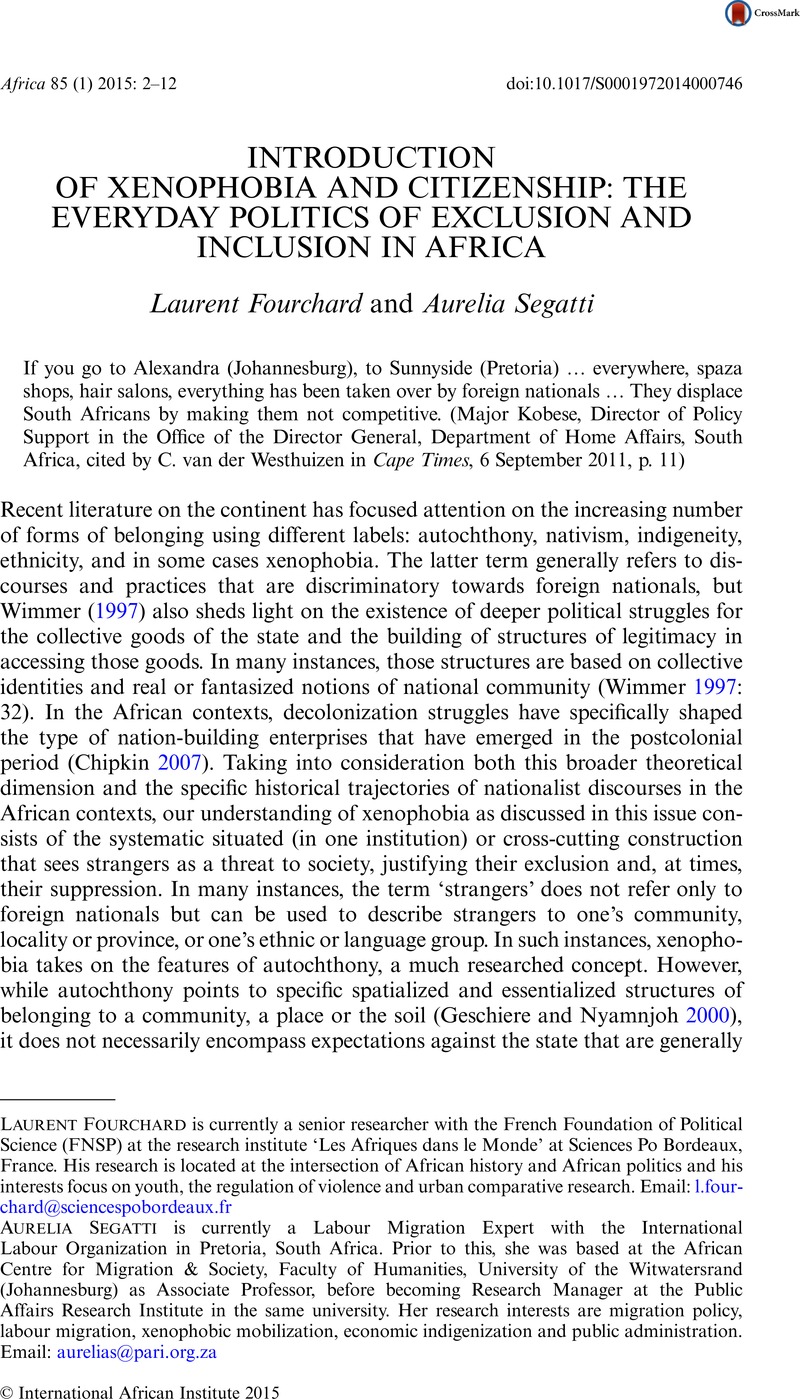Crossref Citations
This article has been cited by the following publications. This list is generated based on data provided by Crossref.
Vidal, Dominique
2016.
Se fondre dans la ville sans rester anonyme.
L'Homme,
p.
233.
Malavolti, Chloé
and
Bouyat, Jeanne
2016.
#NOTOXENOPHOBIA prend la rue à Johannesburg.
Journal des anthropologues,
Vol. 144-145,
Issue. ,
p.
241.
Golaz, Valérie
Médard, Claire
Mwangi, Susan
and
Équipe M-PRAM
2017.
Ouganda, les jeunes dans la région du lac Albert.
Afrique contemporaine,
Vol. N° 259,
Issue. 3,
p.
95.
Amusan, Lere
and
Mchunu, Siphiwe
2017.
An Assessment of Xenophobic/Afrophobic Attacks in South Africa (2008–2015): WhitherBatho PeleandUbuntuPrinciples?.
South African Review of Sociology,
Vol. 48,
Issue. 4,
p.
1.
2018.
Trier, exclure et policer.
p.
329.
Sindzingre, Alice Nicole
2018.
Can the Concept of Exploitation be Associated with that of Inferiorisation? A Critical Analysis.
Cahiers d'économie Politique,
Vol. n° 75,
Issue. 2,
p.
203.
Fourchard, Laurent
2018.
Citoyens d’origine contrôlée au Nigeria.
Genèses,
Vol. n° 112,
Issue. 3,
p.
58.
GAIBAZZI, PAOLO
2018.
West African strangers and the politics of inhumanity in Angola.
American Ethnologist,
Vol. 45,
Issue. 4,
p.
470.
Bouyat, Jeanne
2019.
Ancrage local et (dé)construction scolaire de la xénophobie : les effets de lieu sur les représentations de l’étranger chez les lycéens de quartiers populaires à Johannesburg.
Hérodote,
Vol. N° 174,
Issue. 3,
p.
65.
Jacobs, Carolien
Ruhamya Mugenzi, Joachim
Lubala Kubiha, Stanislas
and
Assumani, Innocent
2019.
Towards becoming a property owner in the city: From being displaced to becoming a citizen in urban DR Congo.
Land Use Policy,
Vol. 85,
Issue. ,
p.
350.
Metsola, Lalli
2019.
Liberation Autochthony.
Conflict and Society,
Vol. 5,
Issue. 1,
p.
186.
Côte, Muriel
2020.
Community-based citizenship: Autochthony and land claim politics under forest decentralization in Burkina Faso.
Geoforum,
Vol. 109,
Issue. ,
p.
171.
2021.
Classify, Exclude, Police.
p.
243.
Saunders, Chris
2021.
Xenophobia, Nativism and Pan-Africanism in 21st Century Africa.
p.
157.
Kirby, Benjamin
Sibanda, Francis
and
Charway, Fred
2021.
Disarming the xenophobic everyday: Muslim migrants and the horizons of urban mutuality in Durban.
Africa,
Vol. 91,
Issue. 2,
p.
296.
Mutanda, Darlington
2022.
Economic threat, new nationalism and xenophobia in South Africa: Some reflections.
African Security Review,
Vol. 31,
Issue. 3,
p.
332.
Kindersley, Nicki
2022.
Dodgy Paperwork and Theories of Citizenship on the Uganda, Democratic Republic of Congo, and South Sudan Borders.
Diaspora,
Vol. 22,
Issue. 1,
p.
103.
Crush, Jonathan
2022.
Xenophobia Denialism and the Global Compact for Migration in South Africa.
Revue internationale de politique de développement,
Vol. 14,
Issue. ,
Kahkonen, Sauli
and
da Silva, Raquel
2023.
Stretching the Peace: The Role of Kundalini Yoga in the Lives of Young People in Alexandra, South Africa.
Journal of Humanistic Psychology,
Cabane, Lydie
2023.
The Government of Disasters.
p.
225.



